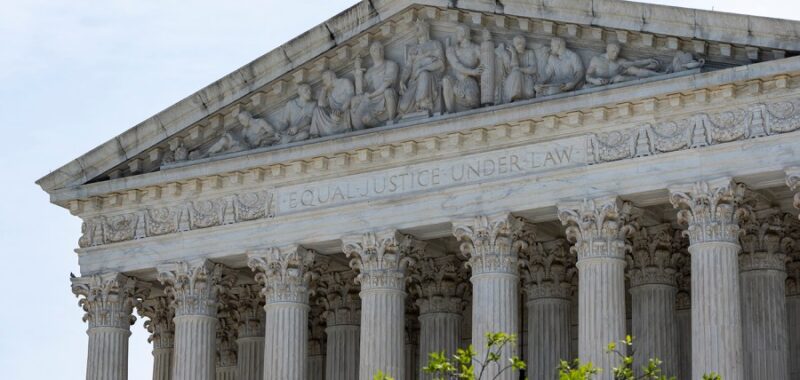
The Supreme Court on Friday said it won’t block Pennsylvanians whose mail votes are voided for technical reasons from voting provisionally at their polling place on Election Day, rejecting a challenge from the Republican National Committee.
The emergency order keeps in place a 4-3 ruling from Pennsylvania’s top court giving voters the additional option to still participate when they return their mail ballot without an inner, secrecy envelope or other issues.
The Supreme Court’s ruling enables an in-person do-over for those impacted voters, even if they live in a Pennsylvania county that doesn’t permit curing of mail ballots when cancelled for technical issues.
Republicans contended the practice violates state law and potentially affects tens of thousands of people, a sizable margin in a key battleground state that could decide the outcome of the presidential election.
The RNC unsuccessfully asked the justices to halt the Pennsylvania court’s ruling or at least separate the challenged ballots until fully resolving the appeal.
“Whether that crucial election will be conducted under the rules set by the General Assembly or under the whims of the Pennsylvania Supreme Court is an important constitutional question meriting this Court’s immediate attention,” the RNC wrote in its emergency application.
The Supreme Court’s order had no noted dissents. Three of the court’s leading conservatives — Justice Samuel Alito, joined by Justices Clarence Thomas and Neil Gorsuch — in a brief statement said they agreed with denying the RNC’s request.
“The application of the State Supreme Court’s interpretation in the upcoming election is a matter of considerable importance, but even if we agreed with the applicants’ federal constitutional argument (a question on which I express no view at this time), we could not prevent the consequences they fear,” Alito wrote.
“The lower court’s judgment concerns just two votes in the long-completed Pennsylvania primary,” he continued. “Staying that judgment would not impose any binding obligation on any of the Pennsylvania officials who are responsible for the conduct of this year’s election. And because the only state election officials who are parties in this case are the members of the board of elections in one small county, we cannot order other election boards to sequester affected ballots.”
Nearly 2.2 million Pennsylvanians have requested mail ballots for the upcoming election, according to data from the Pennsylvania Department of State. The MIT Election Data and Science Lab estimates roughly 1.1 percent of mail votes in 2020 were rejected as naked ballots.
The dispute is part of a broader barrage of election lawsuits filed in the key swing state ahead of Tuesday’s contest. Other challenges implicate overseas ballots, mail ballots with missing dates and long voting lines.
Republicans have increasingly pulled the Supreme Court into the pre-election litigation, and many court watchers expect challenges to the election results will ultimately reach the justices.
The case at hand in Pennsylvania arose after two Butler County residents returned mail ballots without the required secrecy envelope in the state’s Democratic primary in April. The county’s election board then rejected the voters’ provisional ballots they cast in person on Election Day.
“This is a win for democracy and the rule of law,” Ari Savitzky, senior staff attorney at the American Civil Liberties Union’s Voting Rights Project, which represented the voters, said in a statement.
“The court rightly rejected this eleventh-hour attempt to discount the votes of Pennsylvanians and interfere in the state’s electoral process. The bottom line is that voters deserve to have their voices heard,” Savitzky added.
The Pennsylvania Democratic Party, which is backing the voters’ challenge, told the Supreme Court to deny Republicans’ application, as did Pennsylvania’s Democratic attorney general.
“For this Court to grant certiorari here, it must conclude that the Pennsylvania Supreme Court’s routine application of statutorily defined interpretive principles was something other than ordinary judicial review. Should this Court go down that uncharted path, federal courts will be asked to do so every time a state court interprets any part of its statutory election law,” the state wrote in court filings.
“In Pennsylvania and across the country, Trump and his allies are trying to make it harder for your vote to count, but our institutions are stronger than his shameful attacks. Today’s decision confirms that, for every eligible voter, the right to vote means the right to have your vote counted,” Harris-Walz Campaign Communications Director Michael Tyler and Democratic National Committee Communications Director Rosemary Boeglin said in a statement.
“While we are disappointed in the Supreme Court’s ruling, we have secured three major victories for election integrity in Pennsylvania just this week: we won extended early voting in Bucks County; we won signature verification and observer access in Erie County; and we won — for the fifth time — the dated ballot case in the Pennsylvania Supreme Court,” RNC spokesperson Claire Zunk said in a statement.
The ruling from the nation’s highest court came moments after the Pennsylvania Supreme Court granted an RNC request in a separate case implicating ballots in the key swing state. The state court reaffirmed that mail ballots must be voided if they don’t have a proper date on the outer envelope.
Updated 9:56 p.m. EDT

